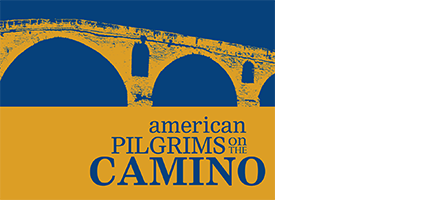2025 Gathering of Pilgrims: Bridges of the Camino – Connecting Cultures & Hearts

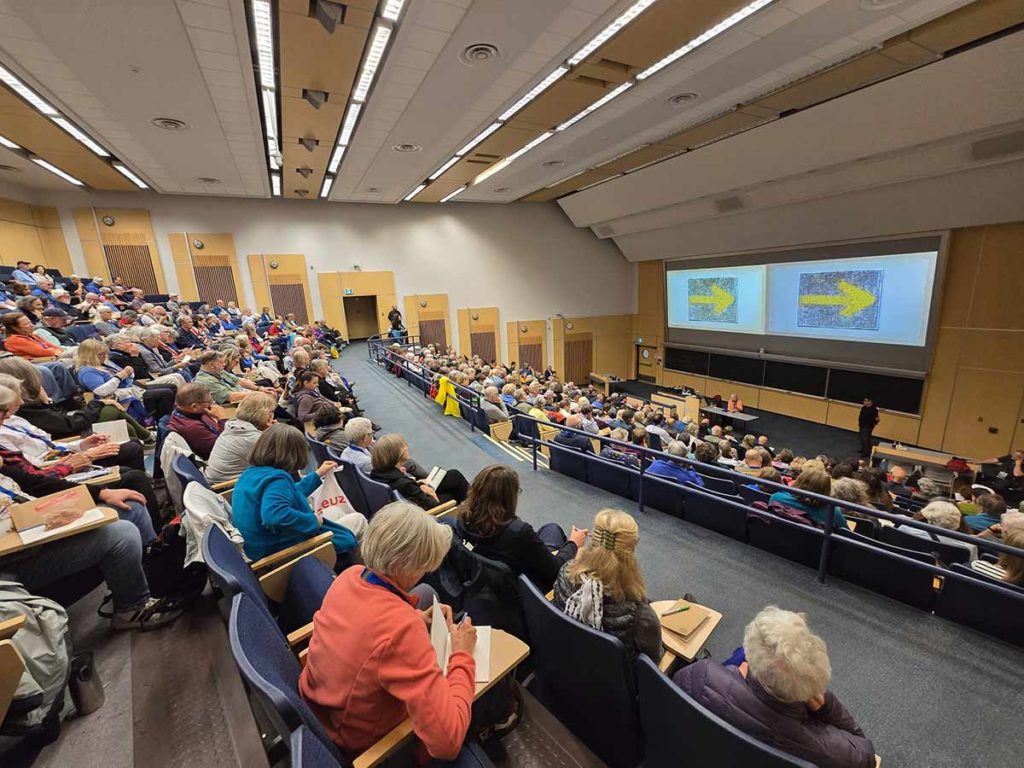
Highlights from the 2025 Gathering of Pilgrims Held May 15-18 in Vancouver, British Columbia
by Martin Peña, Co-chair, 2025 Gathering Committee
How do you connect the cultures and hearts of nearly 400 pilgrims?
You gather them in one place. You share stories, songs, and wisdom. You walk beside each other—sometimes in silence, sometimes in laughter. And you build bridges—through conversation, creativity, and the Camino spirit.
The 2025 Gathering of Pilgrims in Vancouver, British Columbia, co-hosted by the Canadian Company of Pilgrims and American Pilgrims on the Camino, brought together nearly 400 attendees for an unforgettable experience. With 46 inspiring presentations, an original theatrical and musical production, a powerful one-woman show, a film screening and director Q&A session, and so much more, the Gathering celebrated connections across borders and generations.
View the following 8-minute highlights reel for a glimpse of the spirit of the Gathering. It shows scenes from the vibrant Mercado del Camino, moments of reflection during the morning Cruz de Ferro walk, and pilgrim connection through the Colección de Sellos, among other highlights. Whether you attended or joined us in spirit, watch, remember, and be inspired.
The Gathering recap that follows contains a lot of content, so we’ve provided a table of contents. It includes Gathering Co-chair Martin Peña’s reflections; a talk from Rebekah Scott in which she explores the ancient wisdom of the Camino and reminds us it is not a holiday hike but a sacred journey of transformation, and remarks from Juan Carlos Pérez Cabezas, who talks about the importance of maintaining the traditional values of the Camino.
Martin Peña: Reflections from Vancouver: A Gathering to Remember
Rebekah Scott: The Wisdom of the Elders & Ten Commandments for Pilgrims
Juan Carlos Pérez Cabezas: Protecting & Sharing an Ancient Legacy
Reflections from Vancouver: A Gathering to Remember
by Martin Peña, Co-chair, 2025 Gathering Committee
From May 15-18, I had the joy of joining nearly 400 fellow pilgrims at the 2025 Gathering of Pilgrims in Vancouver, British Columbia. This year’s event was truly special—not just because of the beautiful setting at the University of British Columbia or the rich lineup of speakers and activities, but also because it was co-hosted by American Pilgrims on the Camino and the Canadian Company of Pilgrims. It was only the second time our organizations came together, and the result was a joyful celebration of Camino connection and spirit.
This gathering’s theme, “Bridges of the Camino: Connecting Cultures and Hearts,” came to life in so many ways. Alfredo Martínez Serrano, Ambassador of Spain to Canada opened the event with a keynote titled “The Camino de Santiago: Connecting Europe, Connecting the World.” His words reminded us of the Camino’s global reach and shared heritage.
Rebekah Scott delivered her inspiring talk, “The Wisdom of the Elders: A Bridge We Cross Together!” She shared her Ten Commandments for Pilgrims, calling us to walk as true, sober, open, and devoted pilgrims. Her message lingered long after the applause subsided. Juan Carlos Pérez Cabezas spoke with urgency about the need for us to protect and share the ancient legacy of the Camino de Santiago and invite others to encounter it as true pilgrims, with respect, humility, and a desire to understand and embrace the essential values that gave life to the Camino. (We share the transcripts of both of these addresses below; I encourage you to read them and ponder their thought-provoking messages.)
Each day of the Gathering began with plenary sessions, followed by afternoons of breakout sessions and workshops. Topics ranged from mobility and accessibility on the Camino to creative expression and practical tips for future walks.
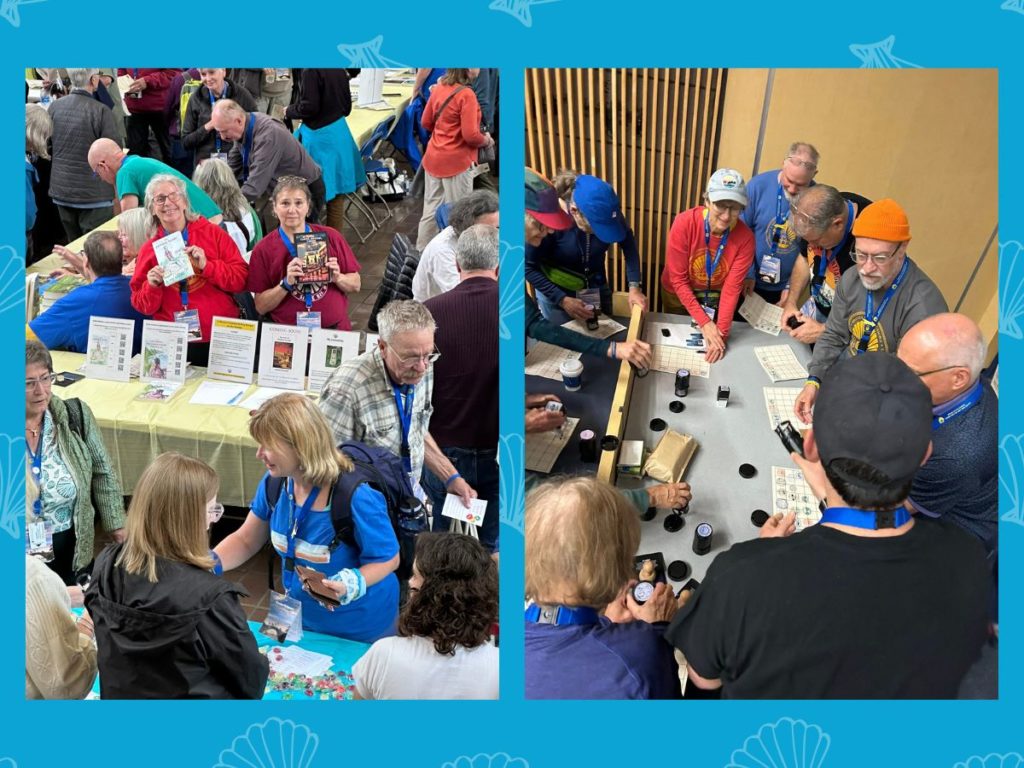
Right: Attendees trade stamps in the Colección de Sellos. Photo by a generous pilgrim.
We browsed the Mercado del Camino, traded stamps in the Colección de Sellos, and reconnected with familiar faces while making new friends. The Cruz de Ferro and In Memoriam ceremonies offered space for reflection and remembrance.
Evenings brought their own magic. Dennis Garnhum’s theatrical production Welcome, Move Forward, Push set the tone on opening night. We also enjoyed a screening of The Way, My Way and a Q&A session with director Bill Bennett and producer Jennifer Cluff. And Celeste Mancinelli’s Canadian premiere of Crying on the Camino captivated everyone with humor and honesty.
Perhaps the most unforgettable moment? The group photo. Hundreds of us, clad in yellow Camino ponchos, formed an iconic yellow arrow. A joyful, unforgettable image of Camino community.
Vancouver gave us a gathering to remember and the bridges we built there will guide us toward the next gathering. I hope you’ll join us April 9-12, 2026, at the next Annual Gathering of Pilgrims to be held at Mo-Ranch in Texas Hill Country outside of San Antonio.
Become a member and receive notices of upcoming Gatherings and other member benefits.
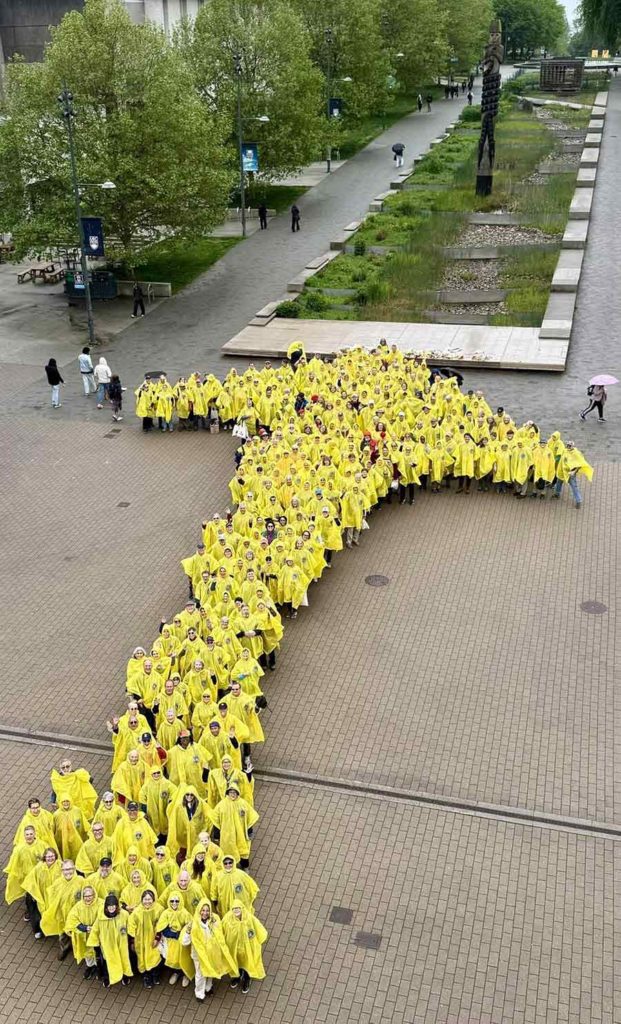
Rebekah Scott is an American expatriate journalist and award-winning Camino advocate. She lives in Moratinos, Spain, and has been a hospitalera, author, guide, translator, and activist, dedicated to preserving the Camino’s traditions.
The Wisdom of the Elders & Ten Commandments for Pilgrims
by Rebekah Scott
I have written this piece a thousand times. It’s called “The Wisdom of the Elders,” but much of the time I feel more like the Camino Cleaning Lady than any kind of sage.
I have lived on the Camino Francés for almost 20 years. I am deeply involved in the hospitality network that makes the Camino function, that makes this hiking trail unique in the world. I am a contemplative Christian who draws great strength and clarity from the Camino’s deeply Christian roots. I believe pilgrims are called to walk, by a God who loves us and wants us to grow. This pilgrimage is one of her boot camps.
I am as qualified as anyone to talk about pilgrims, and pilgrimage.
And so I will. Buckle up for some hard-won wisdom.
First off, the Camino nowadays is a whole lot of things besides a pilgrimage pathway. Thousands of people flock there every year to “do their own camino,” to enjoy great food, drink, and companionship in charming, newly built, trendy environments. They stay in private rooms, send their backpacks ahead each day, and have lovely walking or e-biking holidays. There’s room for all this on the Camino, but these are not the people or experiences I am talking about here.
I am talking about the old-school pilgrimage. A camino walked as a spiritual discipline. I want to show you what is possible on this path, if it’s taken seriously and followed with care.
This is the pilgrimage our grandparents passed down to us through a thousand years. It is tough and austere. It is inexpensive. It is utterly simple. It follows a trope as old as written history: The Hero’s Journey. Leave home, lose yourself, die. Transform, resurrect, return home enlightened.
The classic, hardcore Camino pilgrimage offers contemporary people an opportunity to play out this spiritual drama in their own lives, in a short timeframe. It uses the same pathways as the tourist offerings, but has a completely different vibe, and a deeply profound effect on the person who undertakes it. It transforms their character. It makes them better.
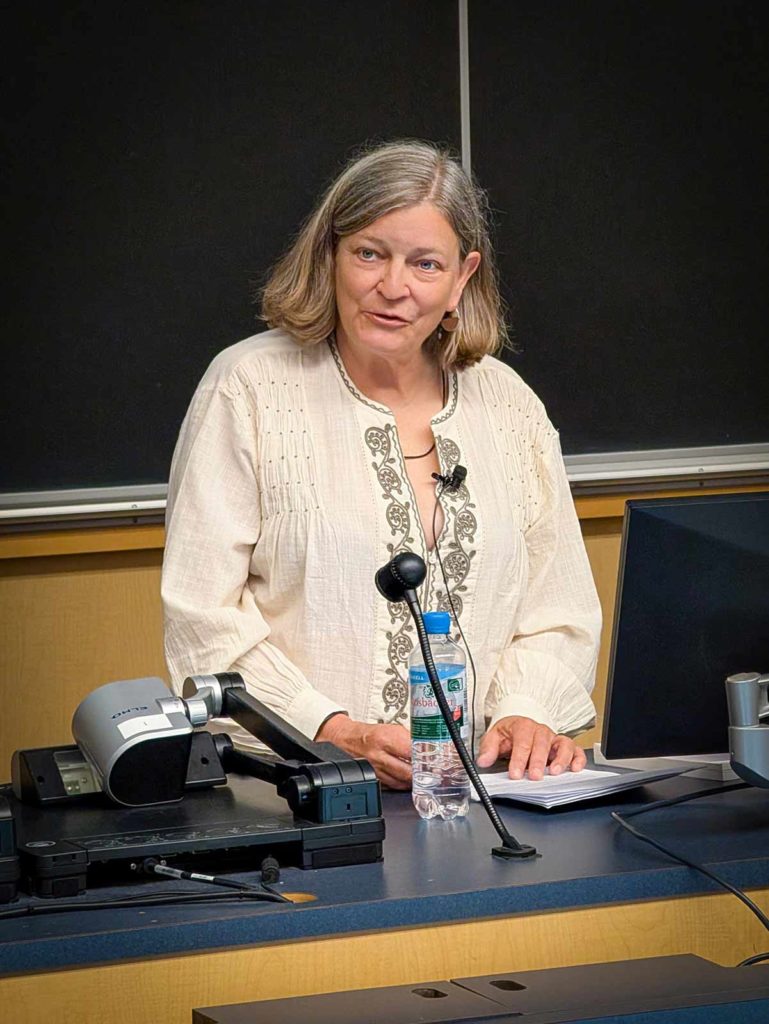
Here is what I have learned, from my years on the Meseta, on the trail, and in the albergues. If you want a classic pilgrim transformation, follow these commandments:
- FIRST COMMANDMENT: The Camino is a holy place.
It commands respect. Walk it all, front to back, without skipping bits or breaking it apart. It was meant to be long, because the longer you walk, the greater the benefit. Every step is sacred. Give it the time and space it needs to expand into you. It is holy, and you the pilgrim are holy. Embrace your holiness, and you will tap into the roaring current of goodness that flows below your feet. You will soon see holiness everywhere around you. You will experience the providence, coincidences, kindnesses out of nowhere. A pilgrim relaxes into this flow. He lets go of his need to control his time and environment. And that is the key to all the rest. Letting go. In trusting the holy spirit to provide the basics, the pilgrim can fly free. - SECOND COMMANDMENT: Go Slow.
Listen to your body. Pray. Stop when you feel tired. Enjoy the food and drink and companionship, but don’t overdo it. This is a path of austerity and self-control, not a fitness challenge or a rolling party. Leave behind the identity you brought from home. You’re just a pilgrim now, entitled to nothing, and should expect nothing. You are only one of many people on this road. - THIRD COMMANDMENT: Be quiet.
Be alone. Carve out time each day for solitude and silence. Pray for yourself, for the pilgrims around you, for your hosts, and those at home. Then silence your soul and walk on, with the ears of your heart open. Hear the trail, the traffic, the birdsong. Talk to yourself, and listen to what you say. Sing. This is Free Time for your mind and soul. Let them come out and play in the sunshine! This is the maintenance your soul longs for. (Beware: Your demons will emerge, too. Sometimes you will cry, or rant, or laugh like a lunatic.) The Camino is the place for deep soul repair. It will break you right open, and it will heal you if you let it. But that happens in silence, pilgrim. - FOURTH COMMANDMENT: Unplug Thyself.
Mobile devices and music and social media and electronic toys are distractions. They waste your time and steal your focus from the important work you came here to do. News feeds full of fear and loathing, as well as daily commitments to self-promotion are what you came to the Camino to escape. I know many useful pilgrim apps are on that screen, and you need to check in at home now and then. But after that? Airplane mode, please. Be here, pilgrim, not someplace else. Leave home behind. - FIFTH COMMANDMENT: Carry your own burdens.
When you see a mess, clean it up. Mind your business and your possessions. Do not expect or demand comfort or convenience. The pilgrim adjusts to the Road. He does not expect the Road to adjust to him. Complicated bookings and baggage services lock a traveler into a place and time each day. The pilgrim is self-contained. She has her things with her, on her back. She doesn’t have reservations, so she can dilly-dally and explore and have adventures! She is not afraid of not having a bed. The pilgrim always finds a place to sleep. Always. - SIXTH COMMANDMENT: Ask for help. Offer help.
Be compassion. The people around you are there for a reason. One may be your next best friend. Step outside yourself, and learn some Korean, or French, or Spanish. Be awkward if you have to. Invite the lonely guy to sit at your table. When someone plays the guitar in the albergue, sing along, dance. Cry some more. Enjoy honest, good company of people you’d otherwise never associate with. - SEVENTH COMMANDMENT: Do not be afraid to suffer.
Pain is inevitable. Suffering, and how you deal with it, is a part of becoming a fully formed, seasoned adult. Pilgrims suffer. Without suffering, there is no transformation. No pain, no glory. This is not a popular idea, but it is truth.
Suffering is built into the circle of life, the seasons of the year, the theology of the Cross we see at every Galician intersection: suffering, death, resurrection. Crucify your ego. Die to Self. Rise again to serve others. The pilgrims of old knew this truth. And they knew, too, that this too shall pass away. Don’t despair. Wait until tomorrow to bail out. Things will get better. - EIGHTH COMMANDMENT: Live the beauty.
A pilgrim is a minimalist. He uses few resources, he sleeps wherever he finds a bed. Fear not the bunk beds in municipal albergues. Accept what is offered, and be grateful. Find your joy under the tree, on the riverbank. The Camino is a spectacular gallery of artworks, made just for you, pilgrim. For those not in a hurry. Sit still inside and outside the churches, and look up into the eaves and rafters—there are angels up there. Sit through the Mass, and see the building in action. Pray there. Feel the vibe of 800 years of prayers.
It’s there, and it’s all the way down the trail. Never miss a chance to glory in the views, the animals, the wine and cheese, olives, tortilla. These are gifts to you, from the loving father who called you here. Each time you see a chapel, a cruceiro, a waymarker—each time you hear a church bell, or a cowbell, or a scrap of radio music, remember how much you are loved. And pass a little ray of that love onto the next person you see. It is easy. It will become natural. - NINTH COMMANDMENT: Keep the kindness moving.
Being a pilgrim will make you very kind. Give it away. A network of unpaid international volunteers is the rail the pilgrim camino runs on. Nonprofit groups run those handy municipal and parochial albergues. They exist so the pilgrimage does not become an exclusive playground for the wealthy and leisured—poor students, bums, and blue-collar workers can be transformed, too. The volunteers are themselves often transformed pilgrims, motivated by their experience to come back and serve another generation of seekers. The finished pilgrim turns outward, he takes the light that’s blasted him clean and shines it to the world outside himself. He is strong, ready to give. He looks for ways to share the light.
What is a true pilgrim? Picture this: An elderly or injured pilgrim arrives late at a crowded albergue, and limps through the dorm, scanning the upper level for that final bunk. The classic pilgrim—the true pilgrim—stands and offers him his lower bunk. That is love. That is a life transformed. - TENTH COMMANDMENT: Realize the miracle that is Grace.
The Camino is a gift to the people of the world. It runs on a variety of love called “grace.” Grace is “unmerited favor.” Something nice, without a price tag. Something for nothing. A gift.
Grace flies in the face of consumerism and capitalism. Grace has nothing to do with money. You put in the time and effort, follow the directions, and give up control, your life will be transformed. It’s that easy. It costs nothing, but it takes everything.
Please do not commit idolatry. Do not mistake the Camino de Santiago for God. The Camino is a hiking trail, a historic site of great value, but it is not magic. It will not provide for you. The provision you experience is people, full of grace, showing you just how much God loves you. The Camino is not a property, a product, or a feeling. It’s not a vibe, or even a spirit. The Camino is us. You, and you, and you. And me.
We provide. We care. We do the work.
My final commandment? Take your transformed self home, and transform your world. Be the pilgrim you’ve become: self-contained, simple, mature. Connected to the God that underpins and oversees all this glorious mess.
One more little pilgrimage story:
Way back before the Exodus, Abraham and Sarah, a pair of early pilgrims, were called to leave home and set out to an unknown country. One day they set up their tent under a mighty oak tree, and sat there quietly, waiting. And along came three men.
Abraham and Sarah greeted them, gave them water to wash up, food and drink and a place to rest. They made them feel at home. The visitors blessed them, and went on their way. Who were those guys?
Those visitors were God.
We honor that image: the breaking of bread, the wine, the blessing, in an icon we keep at our house. Love and grace and hospitality is not limited to the Camino trail—it is wherever we are. Love travels with us. The supply is endless. And as long as we keep giving it away like drunken sailors, we will never, ever run short.
Wherever you go, pilgrim, you are Home. You are grace. Let your light shine.

Juan Carlos Pérez Cabezas is president of both the Asociación de Amigos del Camino de Santiago de Astorga y Comarca and the Fraternidad Internacional del Camino de Santiago (FICS). A dedicated Camino advocate, he oversees pilgrim services in Astorga, including the Albergue Siervas de María and promotes Camino culture and international volunteering. In April 2025, he helped inaugurate Madrid’s first stable pilgrim hostel, the Albergue de las Comendadoras de Santiago in the Real Monasterio, to welcome international walkers at the start of their pilgrimage.
Protecting & Sharing an Ancient Legacy
by Juan Carlos Pérez Cabezas
It is an honor for me to address all of you today, pilgrims at heart, enthusiasts of the Camino, guardians of a legacy that transcends borders, languages, and generations.
The Camino de Santiago was born at the deepest entrance to Europe, in the ancient tradition of effort, sacrifice, and quest. For centuries, men and women of all social classes walked toward the Apostle’s Tomb, moved by faith, penance, or simply by the desire for personal search and transformation. Protecting the Camino is not a whim: it is an essential part of our common identity. Today more than ever, as on the Camino itself, it is universal and integrative. We live in times of accelerated globalization, where physical distances have shortened, but where the profound meaning of traditions is often blurred. These are necessary intellectual references for the souls of the world’s people. Globalization, properly understood, should be a fruitful encounter between cultures, an enriching exchange. But when it is superficial, it runs the risk of standardizing everything, of turning the legacy of centuries into mere scenery, into a spectacle for quick consumption.
The Camino de Santiago, and especially the French Way, is a child of medieval Europe. Of a Europe that knew that the meaning of life is not found in comfort, but in effort, in searching, in the inner journey. However, as we welcome so many pilgrims from other continents today, particularly from the English-speaking world, we see an extraordinary opportunity: the opportunity to share this ancient legacy, to invite others to enter, not as tourists, but as true pilgrims.
But this encounter will only be fruitful if it takes place from profound respect, from humility, from the desire to understand and embrace the essential values that gave life to the Camino:
- sacrifice,
- austerity,
- hospitality,
- and inner transformation.
Therefore, with the greatest respect and affection, we ask our sister associations, especially those I am addressing at this time, to redouble their efforts to transmit to new pilgrims the true spirit of the Camino, which I could summarize in the following points:
- The value of sacrifice over comfort.
- The beauty of austerity over excess.
- Human encounter over mere consumption.
- Respect for history over trivialization.
- And, above all, the experience of a profound inner life that cannot be purchased but is achieved step by step.
Austerity is not a deficiency: it is a value. It is in simplicity that the pilgrim discovers their inner strength, where they learn to walk more lightly, to share, to appreciate every gesture, every small detail. Without austerity, the Camino loses its depth and its magic. Today, the Camino lives on. But its soul is fragile. And we must be aware of the challenges we face. One of our greatest concerns is the tendency, among a significant number of pilgrims in Spain and around the world, to reinterpret the Camino from a perspective unrelated to its history. We are referring to that overly commercial vision; the simplification of effort; the excessively touristic or utilitarian interpretation that has taken hold among many.
The Camino is not a product. It is a rite of passage. A path of transformation. And as such, we must protect it and teach it faithfully. And together, we can do better. It is in this context that an opportunity as valuable as it is urgent arises: the union of disparate cultures and societies. And it is precisely here that the Camino de Santiago, as a space for encounter, plays a unique role: as a civil rehearsal ground for a profound dialogue between different worldviews. Between different ways of understanding life. Because, if there’s one thing that globalization has taught us, it’s that the true richness of encounter lies in the ability to collaborate and share, to unite the best of each culture without renouncing our roots and identities.
And, in this same vein of loyalty to the traditional spirit of the Camino, I want to share with you some great news, which many of you will already know. All the organizations present here have played a very important role, and for that we thank you. The Astorga Association, along with many others, has promoted the opening of a new hostel in Madrid. A hostel that continues the legacy of the Traditional Jacobean Welcome. That form of hospitality that not only offers a bed, but also listens, gives advice, and spiritual support. A hostel that responds to an explicit need that pilgrims, especially those from outside Europe, who come to Madrid had and still have. One of the great cities of the world, as such, is inhospitable to those seeking shelter and an outstretched hand, as is the case with pilgrims. The work has been arduous, laborious, and at times discouraging, but today we can say that, thanks to all of you, American Pilgrims on the Camino and Canadian Company of Pilgrims, and others organizations from around the world, pilgrims now have a refuge and information center in the first place in Spain they set foot on their Camino: Madrid (we also want it to function as a resting place upon departure).
With its launch, together we are embarking on a new milestone for the Camino de Santiago in the 21st century and continuing a task that the Astorga Association has been clear about from the moment it was founded in 1989: to care for and serve pilgrims. This hostel will reflect our firm convictions about what the Traditional Jacobean Welcome should be like. In this sense, we are very clear: our traditional hostels are not, nor should they be, hotels. They are places where pilgrims meet, help each other, and recognize each other as equals. They are, in short, living extensions of the spirit that made the Camino great. And this philosophy has been promoted. Furthermore, through its operation, we aim to give back to the associations a little of what they have contributed to us, giving them the prominence their work deserves. If they so wish, we will strengthen their role on the Camino in their respective countries, making them tutors or intermediaries between the hostel and the pilgrims who wish to stay there.
Finally, and always with the utmost respect for others, a note about a route that concerns us especially: Camino Francés. Among all historical itineraries, Camino Francés occupies a unique place. It is not only the oldest route, but also the most symbolic, the most laden with memory and meaning. Through its paths, Europe was woven, cultures merged, and networks of solidarity between peoples were established. The French Way is the great backbone that shaped the very idea of universal pilgrimage. Therefore, we believe it should always be the first pilgrimage made by any pilgrim. The Camino cannot be understood without exploring its oldest route, its history, its art, its traditions, and its places of Jacobean memory, including the very route along which hundreds of thousands of pilgrims throughout history have left their mark.
Dear friends, the future of the Camino de Santiago depends on all of us. Not only on our infrastructure, but—above all—on our ability to transmit its legacy with authenticity and passion.
Let us walk together, faithful to the spirit of those who came before us. Let us walk together so that the Camino continues to be a beacon of meaning in a world that has often lost it.
Thank you very much. Buen Camino.


